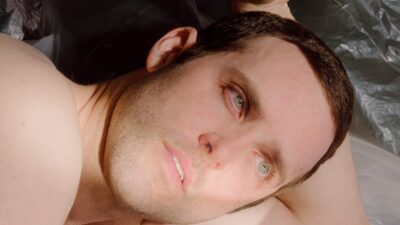In the dimly lit corner of a Pizza Bar, in small town West Virginia, a 16-year-old girl performs for a crowd of mostly her father’s coworkers. He has incentivized the show with free pizza for all who attend—he has always had “total dad-ager vibes.” She sings hours of covers with a few originals here and there. After the show is over, the girl packs up her belongings as a married couple approaches her father. She, in earshot, hears, “We are never coming back to one of her shows again!” The couple feels one song, brazenly belted by the teen, was overly queer yet her father calmly responds, “Well, you’re gonna miss out on the free pizza.”
Many years later, that little girl would perform a solo set at heralded Los Angeles venue The Echo. The show would have bits and bobs of different people: some ordering vodka on the rocks to impress their dates, friends of the night’s performers urging for entertainment with screams. As most concerts go, there will be talking over the music to pass the time; someone will rush in late and complain about the lack of parking. When the girl, now a woman, introduces herself, the cast of characters would pay her no mind. Some may give a passing nod, or a polite glance but most can not be bothered. “This song is called ‘Jacqueline.’ I lost my mother about a year ago to suicide and this song is for her,” she says.
What follows is a level of lyrical poignancy most artists only dream of. “Wondered if you knew I’d find them and I’d fall to the floor / Screaming out at god / Wishing you would walk in just to kiss me and hold me / Jacqueline, ain’t that a shame.” In one of those fabled moments, all the noise of the busy LA streets fell away, no one could do anything but beam up at this woman shrouded in neon lights and clutching her guitar like a best friend.
—
Growing up in conservative Appalachia, Rett Madison learned early on that queerness and danger were societally synonymous. In Sunday School, the patron priest would catalogue sins like bingo numbers; any reason to live was another tenet for hell fire. Unfortunately, Madison’s vocabulary did not measure up to her passion, yet she remained resilient in her condemnation for the thinly veiled bigotry spewed around her.
Madison, from the desk of her LA apartment, explains that Appalachia and the South are often written off as having a stereotypical ignorance propagated by coastal elitism. “People in that part of the country might not have the same education or knowledge of semantics for systemic oppression, but West Virginia has the most trans people per square capita in 2017, and most labor unions started in Appalachia! Their lack of access to higher education does not negate their need for protection, support, and care. And furthermore there are already progressives working there and fighting in those areas but are consistently relegated.” Madison finishes her point loudly, but gently places the coffee her partner has prepared down on the desk. She sniffs the air for a second—we agree that coffee always smells and tastes better when someone else makes it.
Unlike most 11-year-olds, Rett Madison felt catharsis from two things: writing songs, and the warmth of community care from performing them at County Fairs and Pizza Bars. Yet by 13, her devotion was to Appalachia, being a good Catholic, and marrying a man. She will think about the previous notions and laugh at them with a charming skepticism. “Will you [marry a man]?” she asks her younger self before giggling again. It wasn’t until 15 that Madison reached a complete turning point: she needed to give music a fighting chance. By 16 she had all but abdicated the thought of conservative, pessimistic adults from her life, cursing she would never let them distract her again as she made her initial descent into Michigan International Airport.
Interlochen Center for the Arts promised “intangible magic that transpires… between two pristine lakes and surrounded by quiet pines,” all under large cerulean letters that state “YOU BELONG HERE.” Madison blossomed into not only belonging, but revitalization from, in her words, “some of the best years of my childhood.” The slough of institutional ignorance fell away like sand embedded in the crevices of beach frolicking, under the steam of hot, progressive, water. Madison, as the strong willed and definitive child she was, would not go to boarding school for anything but songwriting. Interlochen, perhaps fatefully, extended its long arms and promised safety in a songwriting program, beginning one year before Madison’s admission. Interspersed with her gratitude is the mention of how incredibly lucky and privileged she was to attend this school. “Interlochen completely changed me as a person.” Later came the University of Southern California’s Thornton School of Music for songwriting. She would attend for two years before dropping out. “If I was a doctor or lawyer, or something, I would hope to finish school but, music, it’s like thank you for the training and…” she holds up a peace sign and laughs.
—
After dropping out, the quintessential burden of existentialism plagued Madison through her coffee shop job. PIN-UP DADDY, Madison’s debut album, features a track named “Twenty Five” that coos, “I’m stuck at a day job that don’t pay enough / Gettin’ drunk off my last buck.” While the chorus screams out like thunder, “And why did I romanticize who I’d be by twenty-five? / And I know that I’m still young but how come I’ve run out of time?.” By 2017, “Twenty Five” and most of the songs on the album had been tracked and recorded.
The thoughtfulness of “Twenty Five” extends into tracks like “Fleas,” where Madison nonchalantly claims, “Oh, you moved on, put a shiny new collar on your fluffy little dog / I bet she don’t mind eating out of your dish / But I never wanted to be your bitch.” On “God is a Woman,” perhaps her most controversial song, detailing the notion that God is a proud, lesbian woman. Madison belts the chorus of, “I bet God’s a woman, and she fucks a woman just as divine / I bet God’s a D**e, and she made rainbows to give us a sign.” On her work being deemed blunt, she explains that her music has always always been foremost about a means of therapeutic release: “I hope everyone can find a safe space in my work but, I’m mostly writing for myself and queer people. I’m not as concerned if people other than that don’t get something from it. I’m not really writing for you.”
The same gumption had fueled a “fuck you” start on Madison’s road less traveled. Theo Katzman of Vulfpeck had offered to fund and produce PIN-UP DADDY. The two of them continue a long tradition of indie artists being idolized for the avenues they peril but with no tangible help from larger record companies. In 2018, the album was effectively finished and Katzman had realized he needed to work on his own album. The pair flourished in reciprocity as Madison helped him create his work and eventually went on tour with him all across the country. Her previous experience touring with neo-funk group Scary Pockets, and doing background vocals for Lorde at Coachella, prepared her in some ways, but not others.
—
Now as she is back home Madison prepares for an even harder toil… Mother’s Day. The only song written after 2018 was a track entitled “Don’t Know Better ‘Til You Do.” Madison makes it the last track on her album, to leave the listener with a devastatingly honest taste in their mouth. “Missed your calls on the phone / Let you listen to the dial tone / When I knew very well we were both alone.” She breaks her own heart as she reveals all the grievances of not showing up for her mother before her tragic passing. She urges, “And I should have done better by you / I should have done better by you / I should have done better by you / But you don’t know better ’til you do.” The track ends with a heart wrenching voicemail from her mother, wishing her a New Year with good health and happiness.
That specific brand of mom guilt gets a completely new spin.“My mom had a complicated history of addiction and mental illness before I was even born,” Madison explains. “She was a warm, loving, and beautiful person, but we fought all the time, and when someone dies tragically you never really get to resolve those complex feelings.” In her short time at USC, Madison made a friend who would lose their mother one year before her own. The pair went to each other’s respective funerals and have always been a support system since they both know this specific shade of grief. “On Mother’s Day now we have this tradition where we get really drunk and try to make a cake. My mom used to swear by Better than Sex cake and so I got all the ingredients to make it but, in case we get too drunk and sad to bake, I bought a premade one.” We both laugh in unison.
Madison, throughout her life and career, has always been straightforward. She has spent too long cowering in the face of adversity, and would rather take life as it comes. At an exceptionally young age, she had to learn that who she is is not to be damned but celebrated—and she did it without a mother to give her reassurance. She feels proud of her accomplishments but prevails through bad moments, while giving her emotions the care they deserve. As she signs her first publishing deal, she also is planning a second album to talk about the “taboo” feelings of being angry or upset with someone who has passed. How do we as people balance the feelings of love with the pride of being heard? Rett Madison illuminates a painful but much needed caveat to the light in the distance.
















Comments